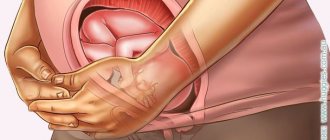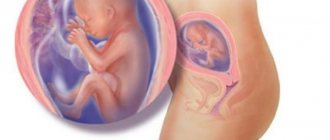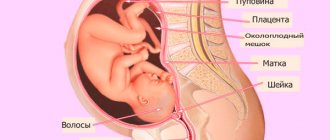Interesting Facts
| Options | Indications |
| Time from conception | 19 weeks |
| Period by month | 21 weeks |
| What month | 5 |
| Dimensions and weight of the fetus | 260-270 mm, 350 g |
| Uterus dimensions | 2 cm above the navel |
| Pregnant weight | From the beginning of pregnancy +3.5-6 kg, increase over the last week no more than 400-500 g |
Your baby is the size of
Large carrot
260-270mm Size
350 g Weight
The unpleasant symptoms of the first trimester of pregnancy are over, but the belly is not yet large enough to cause significant discomfort. Therefore, at 21 weeks the mother usually feels good and confident. And the unborn child continues to grow and develop, his motor activity increases.
Woman at 22 weeks
You have already had an ultrasound. Based on the results, the doctor confirmed that she was 22 weeks pregnant. Fetal development is all that mothers care about today
But it is equally important to know what is happening to your own body. Now you've reached the halfway point
This is a significant milestone; then time will fly even faster, bringing the due date closer every day. Now the top of the uterus is located at the level of the navel, and gradually it will rise even higher. Making sure you're getting enough iron is now a real must. This is required by a growing baby, the placenta and a constant increase in the amount of blood. Surely your gynecologist will prescribe iron supplements as soon as you reach the 22nd week of pregnancy. The development of the fetus occurs by leaps and bounds. Now there are increased demands on women's nutrition. We will talk about this a little later, but for now we will continue to discuss the feelings of the expectant mother.
Feelings of the expectant mother
Normally, a woman gains 6-6.5 kg, the weekly increase is 500-800 grams. Monitor your weight yourself: a sharp increase is an alarming symptom.
You may occasionally feel a tug in your lower abdomen. If the sensations are moderate, are not accompanied by bleeding and go away on their own, there is nothing to worry about. Pain may be associated with increasing stress on the ligamentous apparatus that holds the uterus, as well as with false Braxton-Hicks contractions. They are named after the doctor who first described them. The reasons for the phenomenon are not fully understood, but starting from 21-22 weeks of pregnancy, this is a completely normal condition.
Fetal movements bring great joy and new impressions to a woman during this period. Now this is no longer a barely perceptible fluttering or gurgling, but full-fledged tremors, which can be observed even visually.
The question “how often should a baby move” at 21 weeks is not yet so pressing. You can count at least 10-12 episodes of movement per day from 26-28 weeks. But if you suddenly stop feeling the movements of the fetus in the womb, this is a reason to consult a doctor: he will listen to the baby’s heartbeat and, if necessary, refer him for an ultrasound.
Discharge.
A woman needs to monitor the amount and nature of discharge. The discharge may now be liquid, but it remains clear, light and odorless. The appearance of discomfort in the perineal area, the appearance of purulent discharge, green or yellow, with an unpleasant odor indicates the possible addition of a genital tract infection. In this case, in order to avoid further infection and the spread of infection to the child, prompt treatment is necessary. The doctor will determine the cause of such discharge, its causative agent and prescribe treatment.
Discharge in the form of scarlet blood indicates a complication of pregnancy. They can occur when the placenta is low or has abruption. Such complications during pregnancy are very dangerous for bearing a baby.
If there is a thin, copious discharge with a watery consistency, it is most likely due to leakage of amniotic fluid. It happens that water leaks unnoticed, a little at a time, in which case the woman only feels the wetness of her underwear. A tear in the membranes poses a danger to the baby; the woman should consult a doctor. Within 24 hours, an infection can penetrate into the child and cause intrauterine infection.
Pregnancy 21 weeks: fetal development
In size it can be compared to a large carrot. His height is 26-27 cm from head to heels, average weight is 350 grams. The baby has room in his stomach, and he makes a variety of movements, turns and somersaults, pushes with his legs.
Sleep-wake cycles appear. And most often they do not coincide with my mother’s. When you are in motion, it rocks the baby, and he most often sleeps. And vice versa, when you lie down, he wakes up.
A baby at 21 weeks of pregnancy gradually swallows amniotic fluid, so he learns to swallow and digest food. The taste of the amniotic fluid depends on what the mother had for dinner. The taste buds of the fetus already distinguish between tastes, and it has been proven that in the future children prefer exactly the food that the woman ate during pregnancy.
Ultrasound.
In the normal course of pregnancy and early registration, the second scheduled ultrasound occurs at this stage of pregnancy. During the procedure, the doctor will be able to advise the woman about the development of the baby and identify threats to pregnancy and the fetus, if any. The sex of the child will become known if the baby decides to turn the right way. The main task for the specialist performing ultrasound is to exclude pathologies in the child, assess his condition, examine the woman’s uterus, the placenta insertion and the amount of amniotic fluid. The baby’s activity will also be assessed, whether its size corresponds to the gestational age, and the heartbeat will be listened to.
Tests and ultrasound
By the 21st week of pregnancy, the results of a triple test will be known, identifying the risk of chromosomal abnormalities and hereditary diseases. If they turn out to be positive or doubtful, additional examination will be needed: a repeat blood test, invasive methods, for example, amniotic fluid sampling.
A woman should visit a gynecologist at least 1-2 times a month. Before this, you need to take a general urine test. The doctor monitors the development of the fetus and changes in the mother's condition by measuring indicators such as the baby's heartbeat, the mother's blood pressure and weight, the height of the uterine fundus and the volume of the abdomen.
18th week of pregnancy: medical examination
What procedures should be performed and which doctor should be visited at 18 weeks of gestation? First of all, a gynecologist. If a woman is registered on time, this period should mean the 4th appointment.
During a visual examination, an assessment is made of the discharge and the general condition of the uterine cavity; a smear is necessarily taken for microflora and cytology. The first identifies inflammatory processes and harmful microorganisms, the second gives a detailed report on the nature of the cells from the cervix.
The second mandatory examination by a therapist: they measure your blood pressure and calculate your heart rate. Be sure to weigh yourself and measure your abdominal circumference. An assessment of the location of the uterus and standing height is given. Listen to the baby's heartbeat. As for laboratory and clinical tests, urine is taken for a general analysis, blood from a vein and finger (general, for sugar, etc.).
Positive emotions are what a pregnant woman needs at any stage
Analyzes
A urine test allows you to evaluate the functionality of the kidneys, and a blood sample helps to exclude or confirm anemia. Poor hemoglobin levels lead to oxygen starvation and also contribute to the development of anemia in the baby after birth.
To exclude chromosomal abnormalities, tests are taken, the so-called “triple test” for the level of hCG, AFP and NE (unconjugated estriol). If there are deviations from the norm, there is a possibility of Down syndrome in the child, hydrocephalus.
Don't panic—these results are not a final verdict. You will most likely be referred for further testing.
What to discuss with your doctor
- It is not uncommon to experience leg cramps at night. The cause is increased load on the lower limbs during the day or a lack of magnesium. Be sure to consult a gynecologist if cramps occur frequently.
- Due to the pressure of the uterus, you may experience heartburn during the 21st week of pregnancy. Small meals and following a diet that excludes fatty and spicy foods will help you cope with it. Discuss with your GP what medications you can use to help relieve your condition as well.
Symptoms and sensations in the twentieth week of pregnancy.
The mother's appetite increases, as at this time the child begins to accumulate subcutaneous fat. Food should be nutritious and healthy. Colostrum begins to be released from the woman's breasts. To remove it, you need to adhere to daily hygiene and change your bra to a larger one in time.
Various pains may appear this week. In most cases, they are associated with the restructuring of the body to bear a child. Pain in the navel is associated with pressure from the uterus on the navel from the inside. This pain will gradually go away on its own as soon as the uterus outgrows and rises above the navel. Pain in the knee joints and legs, night cramps can be associated with excess weight, heavy load on the legs during prolonged standing and lack of calcium. At the end of the day, it will be useful for a woman to lie down with her legs elevated and place a cushion under them. As pregnancy progresses, the load on the spine will also increase.
To prevent pain in the spine and lower back, prolonged walking should be avoided. When sitting, you should not cross your legs, lift weights, or get out of bed abruptly. Abdominal pain can be short-lived or pain that is dangerous. If pain occurs on the sides, appears from time to time, intensifies when sneezing or coughing, then it is associated with the growth of the uterus and does not pose a danger.
Cramping pain in the lower abdomen, radiating to the lower back, is a symptom of uterine hypertonicity. Such pain requires the attention of doctors, and if bleeding occurs against the background of it, then there is a risk of losing the child. Increased uterine tone can provoke premature birth.
Possible complications
The twenty-first week of pregnancy is a relatively calm period. The risks of spontaneous abortion are minimal compared to the first trimester. However, you need to know those alarming symptoms that indicate complications of pregnancy and require immediate medical attention. Timely treatment in most cases allows you to save the fetus and minimize risks for the woman.
Placental abruption
This diagnosis is made if the placenta separates from the physiological attachment site in the uterine cavity. Manifests itself in the form of heavy bleeding, dizziness, hypotension and severe pain in the lower abdomen. The condition requires immediate treatment in a hospital setting.
Low placentation
If ideally the placenta is attached to the highest point of the uterus, but with low placentation it is located closer to the exit of the uterus. This is dangerous because as the fetus grows, the placenta may begin to separate. There is no specific treatment. Physical activity and sex are prohibited for a pregnant woman; regular frequent monitoring by a specialist is indicated.
I don't feel any movement...
The phrase “I don’t feel the movements of the fetus” is most often heard from primigravidas who cannot wait for this exciting moment. The expectant mother can understand how she wants to quickly feel the child that you carry under your heart. But should you worry and when?
The timing when you begin to feel the baby is different for all women, and depends primarily on what kind of pregnancy it is. As a rule, during the first pregnancy they begin later than during the second pregnancy. During the first pregnancy, this is due to the fact that the mother, due to inexperience, cannot recognize the delicate first tremors, mistaking them for natural sensations of the body, and only with a second pregnancy, already called experience, is she able to catch them earlier. So if you don’t feel internal tremors at 18, 19 or even 20 weeks, it’s completely normal, this should not cause alarm, be patient.
The answer to this important question may lie not only in the duration of pregnancy, but also in your physique, the location of the placenta (if it is on the anterior wall of the uterus, movements are felt later), your fullness and simply individual sensitivity.
The absence of shocks may also be due to an error in the timing; it is not for nothing that they are guided by the timing and by the first movement. If you haven’t had a single ultrasound yet, and you are guided only by menstruation, you can easily make a mistake in the due date by two or even three weeks, since ovulation sometimes occurs at a time that does not exactly coincide with the calculations.
In general, the manifestation of physical activity of the fetus can take from 16 to 24 weeks for different women, and all these are normal periods that should not bother you.
A decrease in fetal movements is something that should really cause alarm, but there are some caveats here too. The child’s motor activity is a reflection of his physical condition and health, on the one hand, on the other hand, it normally subsides towards the end of pregnancy, as the space in the uterus decreases; before childbirth, this is the norm.
In the early stages, when you just feel new life under your heart, there will be periodic tremors; you can only feel those moments when the baby does something really special, for example, rolls over.
The absence of fetal movement for several hours at 17-21 weeks does not mean anything. Sluggish, irregular manifestations, as pregnancy progresses, will certainly become more and more distinct; at the end of pregnancy, the baby will sometimes even cause you pain.
Weak points before birth are nothing, however, you should always remember the possibility that the baby may not move well due to a disorder.
During hypoxia, fetal movements initially intensify; the child’s movements accelerate the blood flow, but very quickly he gets tired and his movements become sluggish. If fetal activity has sharply decreased, or even disappeared completely, you should urgently inform your doctor.
When to be alarmed?
In general, you should feel at least 10 progressive movements per day, you can use the “count to ten” test by Dr. George Pearson. The baby may become quiet, and it is not at all uncommon for the mother to suddenly stop feeling the baby for several hours, and this is normal. For example, during the day you may not hear him at all, he is rocked by your movements, walking and he just sleeps, and at night he will give you a disco. But if there are no movements for more than 12 hours, or you notice a decrease in actions, there are fewer than 10 episodes per day - perhaps not all is well.
If progressive actions from the inside have stopped, contact a gynecologist; most likely, the doctor will prescribe you an additional examination: CTG, ultrasound, listen to the child’s heart. During hypoxia, if the baby has little oxygen, the heartbeat decreases in frequency, and poor fetal movement is one of the important symptoms. If your pregnancy period allows, in case of severe hypoxia, they will prefer to give birth to you ahead of time in order to save the baby’s life; in case of mild hypoxia, timely treatment will prevent complications.
Conclusion:
– You may not feel the baby until the 24th week of pregnancy and this is normal.
– Constancy and maintenance of the baby’s activity evenly day after day is important; a decrease or absence of movements is a reason to immediately consult a doctor, the child may be in danger.
Why do leg cramps happen so often during pregnancy and how to get rid of it?
Lifestyle recommendations
- Do not lift heavy objects and avoid stressful situations, as these are additional risk factors that affect the tone of the uterus.
- Do not use aggressive household chemicals: harmful volatile substances entering the body through the respiratory tract can lead to poisoning.
- Do not visit a bathhouse or sauna, do not take a bath or shower with a water temperature above 37-38°C, since steam and hot water raise a woman’s body temperature, which provokes developmental defects in the child, and in some cases leads to the threat of miscarriage.
- Wear shoes that are spacious, do not constrict your feet, and do not have high heels.
- Sleep on your left side with pillows under your back and between your knees. Take rest during the day.
How often does Lala move at 20-21 weeks?
We are now 21 weeks) in general, everyone has different movements, well, we are no exception) at first I felt it only in the evening when I went to bed, now it happens both in the morning and during the day, my husband said that one night he hugged me and the baby I conveyed my greetings to him through my tummy) and it happens that during the whole day he will push you a couple of times. you won’t guess, but the funniest thing is when you’re standing somewhere in a store and he starts pushing))
My husband and I are going to the store, ton, ton... But my husband can’t feel it through his stomach yet. The baby is on the front wall.
ours on the back wall, my husband can already feel it and is terribly happy)) but I can’t tell with my hand whether I feel it or not, I already feel it from the inside, but he says that there has been contact for a long time))
Oh, well, that’s because it’s on the back. And we have a powerful layer;)
Yes, I heard that because of this, it starts to be felt later, but still)) it’s okay, soon my husband will get enough of these sensations)))
Ukraine, Krivoy Rog
I have been feeling movements since the 18th week, about a week after the beginning of the movements I also had thoughts like yours, there were also very calm days. I felt movements only when I was lying on my back. And now she constantly makes herself known, whether I’m lying down or going somewhere, I still feel the baby turning over and kicking. So you're okay, just a little time
Thank you. I can now feel it on my back and on my left side. I’m just waiting for them like that all the time.
You don’t have to count yet, my little ones sometimes quieted down for 1-2 days, moved in different ways, sometimes actively, sometimes little, they only begin to move more or less steadily at 30 weeks
All movement tests are usually done after 30 weeks.
Yes, thank you, I also read that tests are from 28-30 weeks.
I always think so, you can feel the movements, which means everything is normal, no matter how many of them there are, but all children are different, I thought mine was calm, I moved very quietly, but just from 28 weeks I felt all the delights of strong kicks, it hurts Sometimes it sucks, especially when someone knocks on my side with a foot, I want to climb the wall)))
I agree, apparently I started counting too early ;). The ultrasound specialist told me, from 30 weeks you will still be so tormented by this ;).
Right now I can especially feel something poking in my urinary tract
Checklist for 21 weeks of pregnancy
The tendency to stretch marks is genetically determined, so if you are predisposed, you cannot completely avoid them. However, there are effective ways to reduce their consequences:
Entrust your pregnancy management to the specialists of the Medical Women's Center. We offer an individual approach, convenient appointment times without queues, constant communication with your doctor, all tests and studies in one place.
Find out everything about your baby's movements at 21 weeks!
The movement of the child in the amniotic fluid is considered to be the movement of the child. This factor indicates that the development process of the little man is taking place.
At 21 weeks of pregnancy, a woman looks good: her hair is thick and shiny, her skin is clean and smooth. The breasts are slightly enlarged, and the tummy is rounded. During this period, appetite increases noticeably, so you need to carefully consider and balance your diet. There is no need to gain extra pounds - this can complicate the birth process.
You need to take walks in the fresh air.
At 21 weeks, an important indicator is the heartbeat and biparental size. At 21 weeks of pregnancy, slight movements are quite normal. During an ultrasound, the location of the placenta is noted, its thickness and maturity, and the amount of amniotic fluid are assessed.
At this stage, the development of the baby’s internal organs is checked. The child's height should be between 25-26 cm and weight up to 400 grams. If at 21 weeks of pregnancy there are no movements at all, this is a reason for additional examination. At this stage, the baby has grown enough for you to feel his movements.
Now the child seems thin, his main goal is to gain fat.
When do the first movements occur?
The baby begins to move immediately after the appearance of legs and arms. It’s just that in the early stages the mother cannot feel any movement. The most noticeable movements occur at 20 or 21 weeks of pregnancy. Each pregnant woman has a certain threshold of sensitivity; fat ones feel movements much later than thin ones.
The baby's movements at 21 weeks may resemble rolling or small pulsations. At such a time, the mother does not immediately understand that these are movements of the baby. From week 30, the tremors begin to really be felt.
What are movements?
So, movements at week 21 are 10 movements per day. When the mother is active and cheerful, the child is also active. Previously, there was an opinion that too frequent movements at 21 weeks indicate fetal hypoxia. This theory has now been disproven. Despite the fact that many mothers notice how the baby’s movements increase at 21 weeks when they are in stuffy and smoky rooms.
Mother's condition
At 21 weeks of pregnancy, the condition of the expectant mother can be assessed as vigorous and good. Women who gain weight quickly this week may experience varicose veins, hemorrhoids and constipation. Late toxicosis may occur. In this regard, to avoid edema, you need to measure your blood pressure as often as possible.
At this time, to identify disorders, a hormonal test is prescribed, which consists of three serum hormones.
Reaction to music
The question often arises whether the fetus reacts to music and other noises. Most scientists say it does.
Sometimes, when listening to certain music, mothers notice more intense movements at 21 weeks. Most often, kids prefer calm and quiet music, mainly classics. Such passions must be treated with respect.
Weak movements
So, if at 21 weeks of pregnancy there are weak movements, then you should immediately consult a doctor. Of course, if there are weak movements at 21 weeks of pregnancy, this is not very good. You need to consult your doctor. And if there are no movements at a later date, this is a good reason for an emergency examination.
To determine the condition of the fetus, cardiotocography will have to be performed. Of course, the heartbeat can be heard with a stethoscope, but cardiotocography is a more accurate technique. With its help, you can not only hear, but also record the heartbeat for subsequent analysis.
If during the examination it was determined that the child’s pulse is too low and he is very sluggish, then it is better to terminate the pregnancy. And this is done, first of all, for the child, since there is something in the mother’s body that interferes with his stay in it. In such a situation, it is better to help the child be born and mature outside the mother’s body.
What is useful to do? During this period, it is recommended to talk to the baby, sing songs to him and read to him. Now the fetus senses the mother’s state and tries to adapt to it. Already now he recognizes fear and joy. You should remain exclusively in a calm state. Anger and irritation may have a negative impact on the child’s nervous system. You need to add calcium to your diet, eat 5-6 times, and do not make your child feel hungry. During this period, you should limit yourself to eating meat and fish dishes, replacing them with dairy products. If a woman is 21 weeks pregnant and there is no movement, then she needs to see a doctor. The baby's movements at 21 weeks of pregnancy should be frequent and noticeable. If there are no movements at 21 weeks of pregnancy, then this is a serious reason to undergo additional examination.
Answers to frequently asked questions
Changes in well-being, abdominal enlargement and numerous examinations usually raise many questions in women. At 23-24 obstetric weeks, people are most often interested in the following.
- Is low placentation dangerous? Ideally, the placenta should be located at the fundus, along the anterior or posterior walls of the uterus. If the distance between its edge and the internal os of the cervix is less than 21 mm, low placentation is established. If the “baby spot” completely blocks the entrance to the uterine cavity, this is a central presentation, the most dangerous condition. Low placentation increases the risk of bleeding during pregnancy, abruption, and the percentage of labor anomalies. But often by the third trimester the placenta “rises” as the uterus grows.
- What happens if breech presentation is established? During this period, the baby can change his position several times during the day. You should be concerned about breech presentation if it occurs after 35 weeks.
- Is it possible to have sex? If the pregnancy proceeds without complications, there have been no previous surgical interventions on the uterus, intimate relationships are allowed. If you have concerns, it is better to check with your doctor.
- What to do if second trimester screening fails? In this case, it is necessary to complete it as quickly as possible to ensure the successful development of the baby.
The 21st week of pregnancy from conception does not bring much new things. The expectant mother does not feel sick; she notices the baby’s active movements. The baby can respond to her voice and touches on his stomach. A measured lifestyle, limited physical activity and compliance with all doctor’s recommendations are the key to a successful pregnancy.
Today I am 22 weeks and 3 days, over the weekend I felt her spinning and spinning there all day. As for me at work, she doesn’t behave so actively. Today it only made itself felt a couple of times. This is fine? I'm already exhausted!
And we're at 23 weeks. Pregnancy 1, 37 years. They did 2 ultrasounds, the fetus is developing well, blood flow is normal, but the placenta has a heterogeneous structure, after a week in the uterus, they will most likely be sent to a day hospital for injections, tablets and droppers. There was no toxicosis or heartburn, sometimes there is a tone, but it goes away quickly. Our boy is kicking as hard as he can.
Hello to all pregnant women) So we are already 23-24 weeks) Everything seems to be not bad, but... I haven’t slept for 3-4 weeks now (My hands are very numb at night, and now even during the day ((( Plus the joints in my hands have started twist. The pain is hellish. Somewhere on the Internet I read the miracle of wrapping hands in food foil! I tried it one night, relief came, but I’m afraid to continue this “treatment”, because I don’t know if it will be harmful for my son (((
23 weeks, I feel absolutely pregnant! ))) I’m finally “bloated”, such a watermelon has grown over the last couple of weeks, and before that there was no belly at all, although on an ultrasound the weight is developing normally... the baby pushes, but only when I’m in a relaxed state... during there is no such day, I’m always worried, waiting for the evening, I already know that as soon as I sit on the sofa, I’ll give my legs a rest, turn on a movie and she comes to life - playing, kicking... There was no toxicosis, no heartburn, except for a couple of times in the evening after a hearty meal dinner))
24 weeks. The changes in my figure are clearly visible, +5 kg for me - on schedule. The doctor was as always: my blood pressure was low, my hemoglobin was low, my stomach was bloated... In general, I will continue to ignore the prescribed vitamins and iron supplements, freshly squeezed juices in the morning and kefir in the evening rule.
The exchange is in hand and I hope to get to the maternity hospital next week. I still haven’t made it to the ophthalmologist (ay-ay-ay, Diana!), although permission to give birth is still given after the 35th week, but I should see it in advance. Back! My back is silent! This is happiness. The nausea in the morning has stopped, which means I have no toxicosis again, neither early nor late.
Condition of the expectant mother at 21 weeks
You are still in excellent shape, so unbearable fatigue and shortness of breath when walking up the stairs may not be a problem for you yet. By the 21st week of pregnancy, your initial weight has increased by about 4-6 kg.
The child begins to grow adipose tissue. So try to be especially careful about what you consume. You can discuss the diet menu for pregnant women with your doctor. Take the vitamins prescribed by your doctor, eat cottage cheese, fruits and vegetables. This all contributes to the proper development of the baby, and also helps the body cope with the load placed on it during this wonderful period.
After all, carrying a healthy baby is a difficult test for every mother.
Symptoms and features of pregnancy
Associated symptoms at 21 weeks of pregnancy may be as follows:
- Breast enlargement and the appearance of colostrum. During pregnancy, the breasts become slightly larger in preparation for the upcoming lactation period. The nipples stand out even more and become sensitive. Gaining more than normal weight can lead to stretch marks on your chest in the future. For most pregnant women, at the 21st week of pregnancy, small drops of colostrum may begin to be released from the nipples when pressed. Colostrum is a yellowish, thick liquid that is the prototype of breast milk. The release of colostrum can begin either at 20-22 weeks or immediately before birth. In both cases, this is not considered a pathology. If there is heavy discharge, you can put breast pads or special napkins in your bra or underwear to prevent the discharge from staining your underwear and clothes;
- Increase in the size of the uterus. What happens to the uterus at 21 weeks of pregnancy? The uterus is already located approximately 1 cm above the navel, and the height of its bottom from the pubis reaches approximately 21 cm;
- Discharge. Vaginal discharge during pregnancy should not be much different from normal. They can only become a little more abundant (this is due to the effect of the hormone progesterone on the mucous membrane). Normal discharge from a healthy woman during pregnancy is translucent or gray-white with a sour odor. If you notice flaky, purulent, cheesy, or strong-smelling discharge, this may indicate a pathology. Watery or bloody discharge accompanied by pain in the abdomen and lower back can lead to miscarriage! Call an ambulance as quickly as possible to avoid harm to the baby;
- Increased hair and nail growth. Due to hormonal changes occurring in a woman’s body, hair and nails may begin to grow faster. The most unpleasant thing about this is that hairs often grow especially actively in undesirable places.
When does the baby start to move?
A woman who has already given birth knows that when the fetus begins to move, the most pleasant and unforgettable sensations are experienced. What should normal movements be like, at what month should the baby move for the first time and how often do these movements occur?
A woman carrying her first child may not immediately understand when the fetus begins to move. Usually, the first movements are perceived as “flying butterflies” or increased intestinal peristalsis. At first the sensations are very weak and are repeated quite rarely.
Try to remember at how many weeks the baby started moving. This date is important for further determining the due date. 20 weeks are added to the date when the first child began to move. And by the time the second child began to move, it was 22 weeks. Of course, calculating the date of the approaching birth based on the timing of movement is very approximate.
So at how many weeks does a baby start to move, and is there any cause for concern?
A woman can feel them under different circumstances. This usually happens in the morning after breakfast
Nutrients rush to the fetus, the child begins to intensively engage in acrobatics, during one of his somersaults he hits the walls of the bladder more sharply than usual and here comes the first push, which doesn’t even look like a push, but more like a careful touch
How can you tell if your baby is moving early? This is difficult to explain to a nulliparous woman. Often the first touches are described as similar to touching the wings of a butterfly. To give more mundane associations, the first touches may resemble a silent rumbling in the stomach.
But even if you constantly listen to yourself and, despite the fact that
has already arrived, you cannot feel any movement - this is not a reason to despair. You may have low levels of sensitivity to stimuli. Just wait a little longer and you will certainly experience these unforgettable sensations.
Hello! Tell me, this is my second pregnancy, I’m not recovering well. What could this be? My 18-week-old baby is moving and my tummy is small.
I am 23 weeks pregnant and have not felt fetal movements for 24 hours. Is this normal?
good afternoon! I’m 19 weeks, movements started at 15, but not very often! I haven’t felt any movements for the last 3 days! I’m worried! What could this be? Please tell me.
show next questions
Good afternoon. This is my 3rd pregnancy. In the first pregnancy I felt movements at 18 weeks, in the second - at 17. Now (third) 17 weeks - no movements. Please tell me the more.
26th week of pregnancy: fetal movements
To understand whether the baby is moving normally, you need to carefully count each movement throughout the day and note the time. Which accounts for every tenth fetal movement. If it seems to a woman that the baby has calmed down, then she needs to take a comfortable position, have a small snack, since eating increases the activity of the fetus, and note how many times the baby has moved in two hours. If there are five to ten movements, then everything is in order. If there are no movements at all within two hours, then the woman needs to walk around and then lie down. As a rule, the movements are then activated. If no movement occurs within another three hours, then you need to consult a doctor. You should always listen to movements. And if the woman thought that the child had become less active, then the doctor should also be told about this.
Strength of fetal movements at 24 weeks
Why is the fetus passive when the 24th week of pregnancy arrives? What is the strength of movements at 24 weeks of pregnancy? Can movements cause premature birth? Answers to these and many other questions can be found in this article.
Some mothers really begin to feel the impending motherhood only with the first activity of the baby, when he begins to move and toss and turn. As a rule, the first movements in the womb can be recorded at 16 weeks. However, the baby's first noticeable movements become noticeable only at 22-24 weeks.
The baby's first movements are quite timid and unlike anything else. Over time, they become more and more meaningful, acquiring a certain meaning and even character. The pace and strength of movements depend on several factors, including the time of day, the position of the mother, the weight of the baby, etc. Thus, the 24th week of pregnancy can continue with movements from 20 to 60 shocks per day
It is important to note that the very first tremors, even at such a long time, cannot always be mistaken for movement, since the fetus is still too small, and there is a fairly large amniotic space in the womb
Don't worry if your baby isn't active enough. In a few weeks, the expectant mother will remember those happy moments when she could enjoy the silence.
According to experts, the closer the due date, the more persistent and stronger the movements become. Moreover, by about 24 weeks the fetus begins to behave like a newborn. The baby begins to actively communicate with his mother through light pushes. He becomes susceptible to the emotional state of the mother when the 24th week of pregnancy occurs.
The movements appear very often. Often the baby even wants to communicate with his mother at night, when she is resting calmly.
Some mothers are concerned about whether it is worth controlling the frequency of movements. There is currently no clear opinion on this issue. If the pregnancy is proceeding normally, the mother does not complain of feeling unwell, and the baby makes itself known at least 10 times a day, then this practice is not required.
First half of pregnancy
Before considering the reasons that some women do not feel movement at 17 weeks of pregnancy, it is necessary to look at the first half of the period. Many women, especially those who are experiencing such a fascinating and at the same time frightening process as pregnancy for the first time, may not know exactly when they should expect movements and tremors.
It’s worth saying right away that for most of the first half of your pregnancy you shouldn’t worry about anything. Up until the sixteenth week, you will not feel any movement at all, because the fetus inside does not yet have sufficient mass and movement capabilities to allow the woman to feel something that is happening inside. Accordingly, you should not worry if you do not feel any movements.
But what happens when the period passes the sixteenth week? Why do many women not feel movement at 17 weeks of pregnancy? It's time to deal with this issue.
Feelings at 17-18 weeks
All women who do not feel movement at the 17th week of their second pregnancy are aware that these sensations, in principle, may not exist. It is extremely rare for movements to appear so early. But what sensations should you expect at 17 or 18 weeks of pregnancy? This is quite an exciting period, as this is when serious signs of pregnancy begin to appear.
Until the sixteenth week, the belly is usually not very large, but from the seventeenth week it begins to grow very quickly. Of course, this begins to cause the expectant mother a lot of inconvenience, since she has to choose a new position for sleeping, weight constantly increases regardless of the amount she eats, and problems with the nipples begin.
But at the same time, there are still no big problems that accompany further stages of pregnancy, but your stomach is already definitely showing everyone your condition, which, undoubtedly, cannot but rejoice. Therefore, follow the advice of women who already have children: if you don’t feel any movement at 17 weeks of pregnancy, don’t worry. It's quite normal. It’s better to listen to other sensations that can definitely please you, since you will literally feel how your unborn child is growing.









